阅读理解训练5篇精练
2023版名校高考英语阅读理解精练含答案解析

2023版名校高考英语阅读理解精练含答案解析建议用时:6分钟难度:★★☆☆☆词数:156语篇类型:应用文主题语境:写信Ms Black,I saw the notice about the dance classes that you are offering(提供).I love dance, and I'm already a very good Latin dancer. Now, I'm interested in learning jazz dance(爵士舞),but before I sign up(报名),I have a few questions for you.First, where will your classes take place(进行)? I can travel a little bit for them, but I don't want to have to go too far. Second, do you teach from 3: 00 pm to 5:00 pm on Fridays? That would be the best time for me because I can't go to the classes you have on Tuesday and Thursday evenings. Finally, do you offer adiscount(折扣)on group classes? Five of my friends said that they would join me if I signed up for one.Please email me back. I look forward to hearing from you.Sincerely,Emily Jones1. Ms Black is probably a(n)____.A. pop singerB. dance teacherC. office workerD. bank manager2. Emily writes this email to Ms Black because____.A. she wants to ask Ms Black some questionsB. she misses Ms Black very muchC. Ms Black can teach her Latin danceD. Ms Black will give her a good price3. When does Emily want to take the dance classes?A. On Friday afternoons.B. On Thursday evenings.C. On Wednesday afternoons.D. On Tuesday evenings.4. Emily wants to know the following things EXCEPT(除了)____A. the place of the dance classesB. the way to sign upC. the price of group classesD. the time of the dance classes5. What can we learn about Emily from this email?A. She is a famous dance teacher.B. She heard about Ms Black from her friends.C. Her home is far away from where Ms Black teaches.D. Some of her friends are also interested in the dance classes.词汇短语already adv. 已经;早已We got there early but Mike had already left.我们提早到了那里,但是Mike已经离开了。
初三英语阅读全真精练(五)含答案
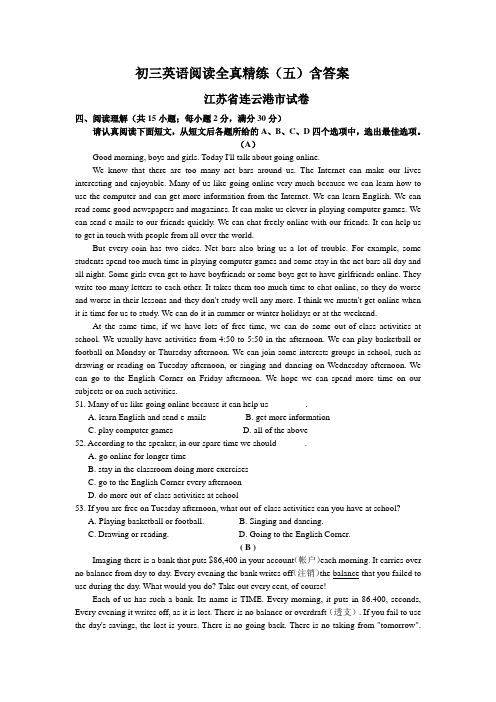
初三英语阅读全真精练(五)含答案江苏省连云港市试卷四、阅读理解(共15小题;每小题2分,满分30分)请认真阅读下面短文,从短文后各题所给的A、B、C、D四个选项中,选出最佳选项。
(A)Good morning, boys and girls. Today I'll talk about going online.We know that there are too many net bars around us. The Internet can make our lives interesting and enjoyable. Many of us like going online very much because we can learn how to use the computer and can get more information from the Internet. We can learn English. We can read some good newspapers and magazines. It can make us clever in playing computer games. We can send e-mails to our friends quickly. We can chat freely online with our friends. It can help us to get in touch with people from all over the world.But every coin has two sides. Net bars also bring us a lot of trouble. For example, some students spend too much time in playing computer games and some stay in the net bars all day and all night. Some girls even get to have boyfriends or some boys get to have girlfriends online. They write too many letters to each other. It takes them too much time to chat online, so they do worse and worse in their lessons and they don't study well any more. I think we mustn't get online when it is time for us to study. We can do it in summer or winter holidays or at the weekend.At the same time, if we have lots of free time, we can do some out-of-class activities at school. We usually have activities from 4:50 to 5:50 in the afternoon. We can play basketball or football on Monday or Thursday afternoon. We can join some interests groups in school, such as drawing or reading on Tuesday afternoon, or singing and dancing on Wednesday afternoon. We can go to the English Corner on Friday afternoon. We hope we can spend more time on our subjects or on such activities.51. Many of us like going online because it can help us ________.A. learn English and send e-mailsB. get more informationC. play computer gamesD. all of the above52. According to the speaker, in our spare time we should ______.A. go online for longer timeB. stay in the classroom doing more exercisesC. go to the English Corner every afternoonD. do more out-of-class activities at school53. If you are free on Tuesday afternoon, what out-of-class activities can you have at school?A. Playing basketball or football.B. Singing and dancing.C. Drawing or reading.D. Going to the English Corner.( B )Imaging there is a bank that puts $86,400 in your account(帐户)each morning. It carries over no balance from day to day. Every evening the bank writes off(注销)the balance that you failed to use during the day. What would you do? Take out every cent, of course!Each of us has such a bank. Its name is TIME. Every morning, it puts in 86.400, seconds, Every evening it writes off, as it is lost. There is no balance or overdraft(透支). If you fail to use the day's savings, the lost is yours. There is no going back. There is no taking from "tomorrow".You must make good use of it so as to get more in health, happiness and success!The clock is running. Make the most of today. To realize the value of ONE YEAR, ask a student who failed a grade; To realize the value of ONE MONTH, ask a mother who gave birth to a premature(早产)baby; To realize the value of ONE WEEK, ask the editor of a weekly newspaper; To realize the value of ONE HOUR, ask the lovers who are waiting to meet; To realize the value of ONE MINUTE, ask a person who missed the train; To realize the value of ONE SECOND, ask a person who just avoided(避免)an accident.Make good use of every moment that you have. Remember that time waits for no one. Yesterday is history. Tomorrow is a mystery. Today is a gift. That's why it's called "The Present".54. The underlined word "balance" in paragraph 1 means .A. 平衡B. 贷款C. 余款D. 提款55. What is special about the TIME bank we each have?A. We can store time in it whenever we like.B. Someone puts $86,400 in it every day.C. The time in it will surely get lost if you don't use it.D. Someone helps you spend your time every night.56. What can be the best title of the passage?A. The Bank of MoneyB. The Bank of TimeC. The value of one hour C. The clock is running57. In this passage, the writer tries to tell us .A. what a bank isB. how to save moneyC. the difference of time units C. to make good use of time参考答案:51—53. DDC 54—57. CCBD江苏省南京市试卷四、阅读理解(共15小题;每小题1分,满分15分)阅读下列材料,从每题所给的四个选项(A、B、C、D)中,选出最佳选项。
2020-2021部编语文小升初文言文阅读及专项练习50篇含答案(全)

2020-2021部编语文小升初文言文阅读及专项练习50篇含答案(全)小升初文言文阅读理解1:虎丘予初十日到郡,连夜游虎丘①,月色甚美,游人尚稀.,风亭月榭间②,以红粉笙歌③一两队点缀,亦复不恶。
然终不若山空人静,独往会心④。
尝.秋夜坐钓月矶⑤,昏黑无往来,时闻风铎⑥,及佛灯隐现林梢而已。
(节选自《游虎丘小记》)【注】①虎丘:苏州名胜。
②风亭月榭间:风吹过亭子月光酒落在树间。
③红粉笙歌:指歌女奏乐唱歌。
④独往会心:一人前往要合我意。
⑤钓月矶:在虎丘山顶。
⑥风铎:悬于檐下的风铃。
1.解释文中加点的词。
(1)稀()(2)尝()2.下列句子朗读节奏的划分不正确的一项是()A.予/初十日到郡B.月色/甚美C.终不若山空人静D.尝秋夜坐/钓月矶3.作者调动了视觉和听觉来写景,请说说文中从视觉和听觉写了哪些景物。
4.作者喜爱的虎丘的特点是什么?译文我在初十到了郡中,当晚就游览了虎丘。
月色非常美好,游人也还不多,风吹过亭子月光酒落在树间,偶尔有一两队歌女吹笙点级,并不扫兴。
但还是不如山林空寂之时,一人前往要合我意。
我曾经在秋夜坐在虎丘山顶的钓月矶上,天色昏暗,无人往来,不时听到悬于檐下的风铃声,还看到佛灯在林间树梢若隐若现。
1.(1)少(2)曾经2.D3.视觉:月色、佛灯。
听觉:笙歌、风铎。
4.月色美好;幽静。
小升初文言文阅读理解2:揠[yà]苗助长宋人有闵[mǐn]①其苗之不长②而揠③之者,芒芒然归④,谓其人⑤曰:“今日病⑥矣,予⑦助苗长矣!”其子趋⑧而⑨往视之,苗则槁[ɡǎo]⑩矣。
天下之不助苗长者寡矣!以为无益而舍之者,不耘苗⑾者也;助之长者,揠苗者也;非徒⑿无(13)益,而又害之。
[注释]①闵(mǐn)——同“悯”,担心,忧虑。
②长(zhǎng)——生长,成长。
③揠(yà)——拔。
④芒芒然——疲倦的样子。
⑤其人——他家里的人。
⑥病——精疲力尽,是引申义。
⑦予——我,第一人称代词. ⑧趋——快走。
小升初语文课外文言文阅读精练50篇及答案
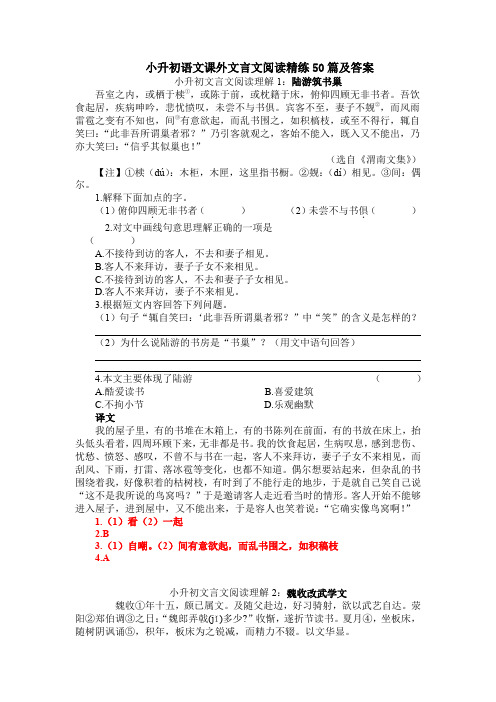
小升初语文课外文言文阅读精练50篇及答案小升初文言文阅读理解1:陆游筑书巢吾室之内,或栖于椟①,或陈于前,或枕籍于床,俯仰四顾无非书者。
吾饮食起居,疾病呻吟,悲忧愤叹,未尝不与书俱。
宾客不至,妻子不觌②,而风雨雷雹之变有不知也,间③有意欲起,而乱书围之,如积槁枝,或至不得行,辄自笑曰:“此非吾所谓巢者邪?”乃引客就观之,客始不能入,既入又不能出,乃亦大笑曰:“信乎其似巢也!”(选自《渭南文集》)【注】①椟(dú):木柜,木匣,这里指书橱。
②觌:(dí)相见。
③间:偶尔。
1.解释下面加点的字。
(1)俯仰四顾.无非书者()(2)未尝不与书俱.()2.对文中画线句意思理解正确的一项是()A.不接待到访的客人,不去和妻子相见。
B.客人不来拜访,妻子子女不来相见。
C.不接待到访的客人,不去和妻子子女相见。
D.客人不来拜访,妻子不来相见。
3.根据短文内容回答下列问题。
(1)句子“辄自笑曰:‘此非吾所谓巢者邪?”中“笑”的含义是怎样的?(2)为什么说陆游的书房是“书巢”?(用文中语句回答)4.本文主要体现了陆游()A.酷爱读书B.喜爱建筑C.不拘小节D.乐观幽默译文我的屋子里,有的书堆在木箱上,有的书陈列在前面,有的书放在床上,抬头低头看着,四周环顾下来,无非都是书。
我的饮食起居,生病叹息,感到悲伤、忧愁、愤怒、感叹,不曾不与书在一起,客人不来拜访,妻子子女不来相见,而刮风、下雨,打雷、落冰雹等变化,也都不知道。
偶尔想要站起来,但杂乱的书围绕着我,好像积着的枯树枝,有时到了不能行走的地步,于是就自己笑自己说“这不是我所说的鸟窝吗?”于是邀请客人走近看当时的情形。
客人开始不能够进入屋子,进到屋中,又不能出来,于是容人也笑着说:“它确实像鸟窝啊!”1.(1)看(2)一起2.B3.(1)自嘲。
(2)间有意欲起,而乱书围之,如积稿枝4.A小升初文言文阅读理解2:魏收改武学文阳②郑伯调③之日:“魏郎弄戟(jǐ)多少?”收惭,遂折节读书。
[全]小学五年级下语文阅读理解提升精练含答案
![[全]小学五年级下语文阅读理解提升精练含答案](https://img.taocdn.com/s3/m/f711559a767f5acfa1c7cdd9.png)
小学五年级下语文阅读理解提升精练含答案《落墨花》五代十国时期,宫廷画家黄荃严谨细腻的花鸟画,被称为“黄家样”。
当时想进入画院的画家都以“黄家体制”为准,几乎人人效仿,全国上下一时蔚然成风。
然而,在江南,却有一位与黄荃画风( )的画家脱颖而出,这位画家名叫徐熙。
徐熙是江南名门望族之后,世代书香。
在诗书环境下成长起来的徐熙,性板( )。
他不做官,喜爱诗文绘画,尤其精于花鸟,平时在家与朋友谈诗论画,常以“江南布衣”自居。
徐熙最喜欢在大自然中以步当车,享受江南( )的景色。
每当他漫步在田间地头,那些生动多姿的杂花野草常常吸引他的注意。
他最喜欢拈花在手,细细地观察每一片叶子的俯仰变化,然后再把它们画到纸上。
自由自在生长在大自然里的汀花野竹、水鸟渊鱼,是徐熙所喜爱的绘画题材。
一次,在郊外,他见到一株果实累累的石榴树,这株树上,挂满了火红的石榴果,他拿出纸笔,调色研墨,开始写生。
徐熙饱蘸了墨,提起毛笔,跟前的石榴树果实晶莹剔透,垂累可爱。
从哪里开始画好呢?他略一犹豫,只听身后“啊”的一声叫。
徐熙回头,只见一个小牧童正站在他身后,好奇地看着他的举动。
徐熙对小牧童一笑,牧童说道:“你落下的墨汁在纸上开花了。
”徐熙低头一看,原来笔上的一滴墨,落到了纸上,那滴墨汁在纸上自由地散开,变成了一个美丽的形状,真的像是开了一朵墨花一样。
徐熙灵光一闪,提笔在这个墨点上略加点染,随后又用浓墨粗笔,草草地画出了一些枝干和石榴叶。
最后,一株果实累累的石榴树,出现在画面上。
这幅画既没有用线精勾细勒,也没有经过反复渲染敷色。
落墨成画,敷彩为花,清新而又生动,彻底摆脱了“黄家样”的样式,呈现出一种与黄荃的“黄家富贵”完全相左的独特风格。
徐熙回到家以后,反复琢磨,用这种写意的方法画了一幅《石榴图》。
在《石榴图》中徐熙共画了100多个石榴果,画面上枝叶纷繁,枝干、叶子均用墨笔画出,空隙间夹杂着石榴果。
整幅画面墨不掩色,色不碍墨,只是略施颜彩。
状物阅读训练及答案小学
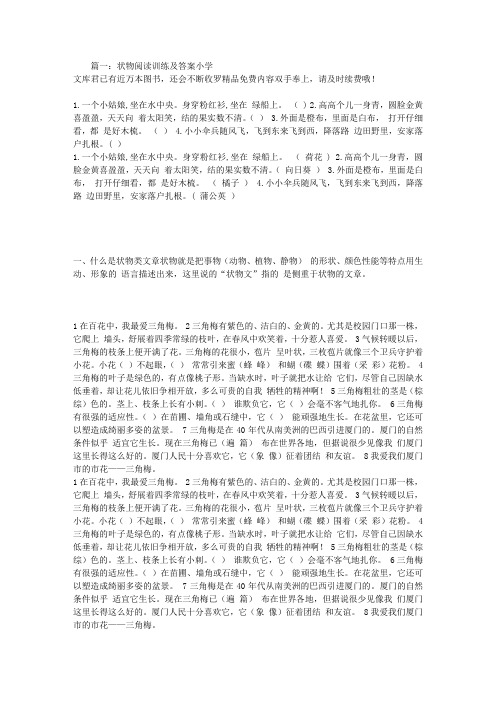
篇一:状物阅读训练及答案小学文库君已有近万本图书,还会不断收罗精品免费内容双手奉上,请及时续费哦!1.一个小姑娘,坐在水中央。
身穿粉红衫,坐在绿船上。
( )2.高高个儿一身青,圆脸金黄喜盈盈,天天向着太阳笑,结的果实数不清。
()3.外面是橙布,里面是白布,打开仔细看,都是好木梳。
()4.小小伞兵随风飞,飞到东来飞到西,降落路边田野里,安家落户扎根。
( )1.一个小姑娘,坐在水中央。
身穿粉红衫,坐在绿船上。
(荷花 )2.高高个儿一身青,圆脸金黄喜盈盈,天天向着太阳笑,结的果实数不清。
(向日葵)3.外面是橙布,里面是白布,打开仔细看,都是好木梳。
(橘子)4.小小伞兵随风飞,飞到东来飞到西,降落路边田野里,安家落户扎根。
( 蒲公英)一、什么是状物类文章状物就是把事物(动物、植物、静物)的形状、颜色性能等特点用生动、形象的语言描述出来,这里说的“状物文”指的是侧重于状物的文章。
1在百花中,我最爱三角梅。
2三角梅有紫色的、洁白的、金黄的。
尤其是校园门口那一株,它爬上墙头,舒展着四季常绿的枝叶,在春风中欢笑着,十分惹人喜爱。
3气候转暖以后,三角梅的枝条上便开满了花。
三角梅的花很小,苞片呈叶状,三枚苞片就像三个卫兵守护着小花。
小花()不起眼,()常常引来蜜(蜂峰)和蝴(碟蝶)围着(采彩)花粉。
4三角梅的叶子是绿色的,有点像桃子形。
当缺水时,叶子就把水让给它们,尽管自己因缺水低垂着,却让花儿依旧争相开放,多么可贵的自我牺牲的精神啊! 5三角梅粗壮的茎是(棕综)色的。
茎上、枝条上长有小刺。
()谁欺负它,它()会毫不客气地扎你。
6三角梅有很强的适应性。
()在苗圃、墙角或石缝中,它()能顽强地生长。
在花盆里,它还可以塑造成绮丽多姿的盆景。
7三角梅是在40年代从南美洲的巴西引进厦门的。
厦门的自然条件似乎适宜它生长。
现在三角梅已(遍篇)布在世界各地,但据说很少见像我们厦门这里长得这么好的。
厦门人民十分喜欢它,它(象像)征着团结和友谊。
现代文文学类阅读理解精练
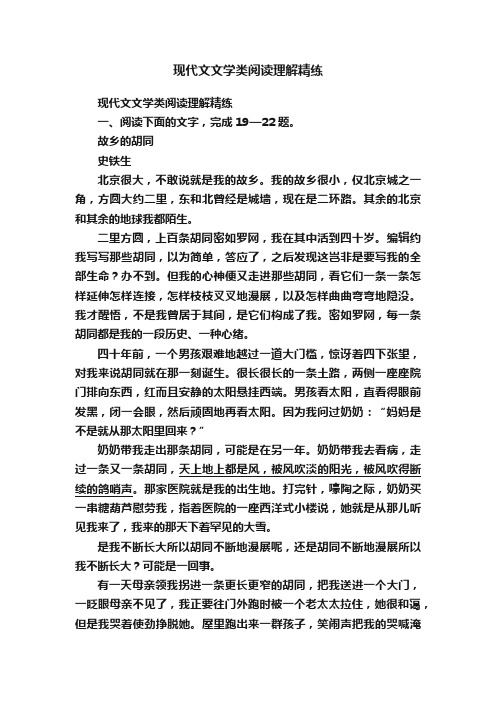
现代文文学类阅读理解精练现代文文学类阅读理解精练一、阅读下面的文字,完成19—22题。
故乡的胡同史铁生北京很大,不敢说就是我的故乡。
我的故乡很小,仅北京城之一角,方圆大约二里,东和北曾经是城墙,现在是二环路。
其余的北京和其余的地球我都陌生。
二里方圆,上百条胡同密如罗网,我在其中活到四十岁。
编辑约我写写那些胡同,以为简单,答应了,之后发现这岂非是要写我的全部生命?办不到。
但我的心神便又走进那些胡同,看它们一条一条怎样延伸怎样连接,怎样枝枝叉叉地漫展,以及怎样曲曲弯弯地隐没。
我才醒悟,不是我曾居于其间,是它们构成了我。
密如罗网,每一条胡同都是我的一段历史、一种心绪。
四十年前,一个男孩艰难地越过一道大门槛,惊讶着四下张望,对我来说胡同就在那一刻诞生。
很长很长的一条土路,两侧一座座院门排向东西,红而且安静的太阳悬挂西端。
男孩看太阳,直看得眼前发黑,闭一会眼,然后顽固地再看太阳。
因为我问过奶奶:“妈妈是不是就从那太阳里回来?”奶奶带我走出那条胡同,可能是在另一年。
奶奶带我去看病,走过一条又一条胡同,天上地上都是风,被风吹淡的阳光,被风吹得断续的鸽哨声。
那家医院就是我的出生地。
打完针,嚎陶之际,奶奶买一串糖葫芦慰劳我,指着医院的一座西洋式小楼说,她就是从那儿听见我来了,我来的那天下着罕见的大雪。
是我不断长大所以胡同不断地漫展呢,还是胡同不断地漫展所以我不断长大?可能是一回事。
有一天母亲领我拐进一条更长更窄的胡同,把我送进一个大门,一眨眼母亲不见了,我正要往门外跑时被一个老太太拉住,她很和蔼,但是我哭着使劲挣脱她。
屋里跑出来一群孩子,笑闹声把我的哭喊淹没。
我头一回离家在外,那一天很长,墙外磨刀人的喇叭声尤其漫漫。
这幼儿园就是那老太太办的,都说她信教。
几乎每条胡同都有庙。
僧人在胡同里静静地走,回到庙去沉沉地唱,那诵经声总让我看见夏夜的星光。
睡梦中我还常常被一种清朗的钟声唤醒,以为是午后阳光落地的震响,多年以后我才找到它的来源,现在俄国使馆的位置,曾是一座东正教堂,我把那钟声和它联系起来时,它已被推倒。
(完整版)小学三年级语文课外阅读理解精练试题全册
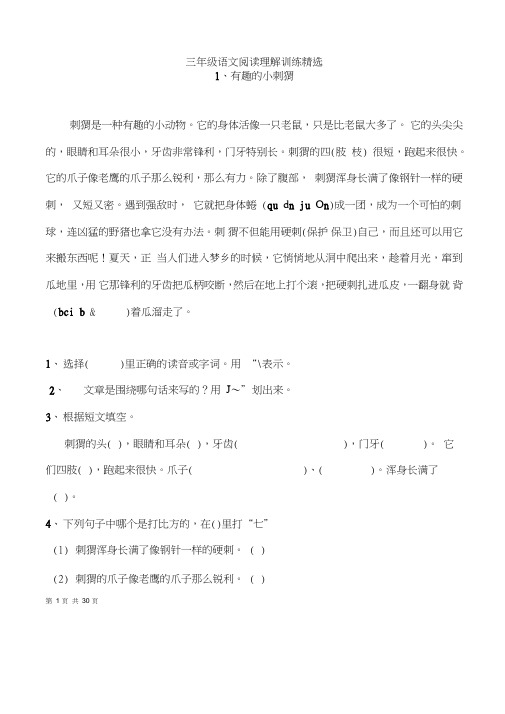
三年级语文阅读理解训练精选1、有趣的小刺猬刺猬是一种有趣的小动物。
它的身体活像一只老鼠,只是比老鼠大多了。
它的头尖尖的,眼睛和耳朵很小,牙齿非常锋利,门牙特别长。
刺猬的四(肢枝) 很短,跑起来很快。
它的爪子像老鹰的爪子那么锐利,那么有力。
除了腹部,刺猬浑身长满了像钢针一样的硬刺,又短又密。
遇到强敌时,它就把身体蜷 (qu d n ju O n)成一团,成为一个可怕的刺球,连凶猛的野猪也拿它没有办法。
刺猬不但能用硬刺(保护保卫)自己,而且还可以用它来搬东西呢!夏天,正当人们进入梦乡的时候,它悄悄地从洞中爬出来,趁着月光,窜到瓜地里,用它那锋利的牙齿把瓜柄咬断,然后在地上打个滚,把硬刺扎进瓜皮,一翻身就背(bci b & )着瓜溜走了。
1、选择( )里正确的读音或字词。
用“\表示。
2、文章是围绕哪句话来写的?用J〜”划出来。
3、根据短文填空。
刺猬的头( ),眼睛和耳朵( ),牙齿( ),门牙( )。
它们四肢( ),跑起来很快。
爪子( )、( )。
浑身长满了( )。
4、下列句子中哪个是打比方的,在()里打“七”(1)刺猬浑身长满了像钢针一样的硬刺。
( )(2)刺猬的爪子像老鹰的爪子那么锐利。
( )第 1 页共30 页5、仔细读读短文,看看刺猬的硬刺有哪些作用?6、有很多动物身体的某一部分都有着独特的作用,你能试着找一种动物写写吗?2、鲁班造伞很久以前,还没有伞。
著名的工匠鲁班和几个木匠一起在路边造了许多亭子。
亭子的顶是尖尖的,四面用几根柱子撑住。
雨来了,或是被太阳晒得难受了,行人可以躲一躲,歇一歇,喘口气儿。
可是鲁班想,要是雨下个不停,那该怎么办呢?人总不能待在亭子里不走啊。
要是能把亭子做得很小,让大家带在身上,该多好啊!用什么办法才能把亭子做得轻轻巧巧的呢?一天,天气热极了,鲁班看见许多小孩子在荷塘边玩,每个孩子的头上都顶着一张荷叶。
鲁班问他们:“你们为什么顶着荷叶呢?”小孩子七嘴八舌地说:“太阳像个大火轮,我们头上顶着荷叶,就不怕晒了。
小升初文言文专项训练50篇(含答案)

小升初文言文专项训练50篇(含答案)小升初文言文阅读理解1:陈章侯蔑视显贵者陈章侯性诞僻①,好游于酒。
人所致金钱随手尽。
尤喜为贫不得志人作画,周其乏。
凡贫士藉其生,数十百家。
若豪贵有势力者索之,虽千金不为搦②笔也。
一龌龊显者,诱之入舟,方将鉴定宋元人笔墨。
舟既发,乃出绢强之画。
章侯科头③裸体,谩骂不绝。
显者不听。
遂欲自沉于水。
显者拂然④,乃自先去。
托他人代求之,终一笔不施。
(选自清•周亮工《读画录》)[注释]①诞僻:怪僻。
②搦(n uò):握。
③科头:不戴帽子。
④拂然:甩动(袖子)的样子。
[文言知识] 说“致”a“致”是个多义词。
一、指“送”。
上文“人所致金钱随手尽”,意为别人送给他的金钱随手便花光了。
“面致”即当面送上。
二、指“表达”。
“致意”、“致谢”中的“致”即是。
今人写信,末了常有“此致敬礼”,意为以此表达我的敬意。
三、指“招引”。
如“致百鸟至”,意为招来数百只鸟。
四、指“尽”。
成语“专心致志”中的“致”即是。
[思考与练习]1.解释:①藉②索③虽④既⑤施2.翻译:①好游于酒②周其乏③一龌龊显者3.上文“笔墨”是指【译文】陈章侯性格怪僻,喜欢游玩喝酒。
别人送给他的金钱随手便花光了。
尤其喜欢为贫穷不得志的人作画,以周济他们的贫困。
依靠他而生活的贫寒士人,一共有几十以至几百家之多。
如果豪绅贵族等有势力的人向他要画,即使送他千金他也是不会提笔的。
有一个人品卑劣的显达者,引诱他进入船内,正在让他鉴赏宋元人的笔墨。
船开了以后,就拿出画绢强迫他作画。
章侯摘掉帽子,脱掉衣服,大骂不止。
那个显达者不听从他的。
于是章侯自己从船上跳落入水。
显达者非常生气,于是甩袖而去了。
后来托了别人代为求画,章侯最终还是没有用一下笔墨。
【参考答案】1.①依靠②讨取③即使④已经⑤给2.①喜欢跟酒打交道;②周济他们的穷困生活;③一个品质恶劣的显贵的人。
3.字画。
小升初文言文阅读理解2:南辕北辙今者臣来,见人于大行,方北面而持其驾①,告臣曰:“我欲之②楚。
五四制六年级 语文课外阅读理解(精讲精练50篇)
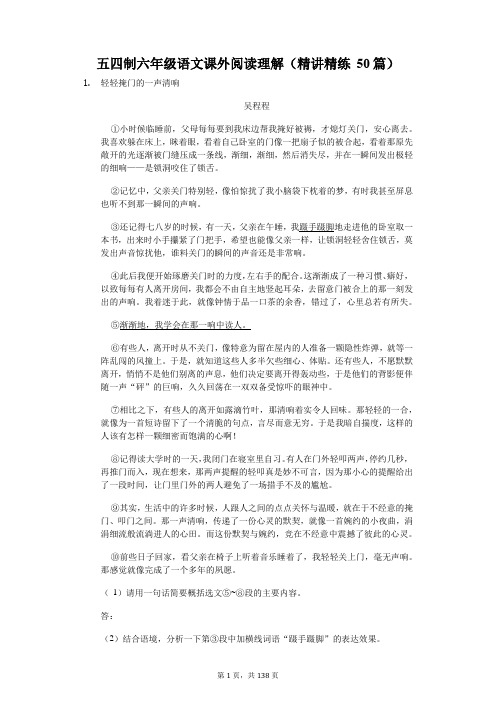
五四制六年级语文课外阅读理解(精讲精练50篇)1.轻轻掩门的一声清响吴程程①小时候临睡前,父母每每要到我床边帮我掩好被褥,才熄灯关门,安心离去。
我喜欢躲在床上,眯着眼,看着自己卧室的门像一把扇子似的被合起,看着那原先敞开的光逐渐被门缝压成一条线,渐细,渐细,然后消失尽,并在一瞬间发出极轻的细响——是锁洞咬住了锁舌。
②记忆中,父亲关门特别轻,像怕惊扰了我小脑袋下枕着的梦,有时我甚至屏息也听不到那一瞬间的声响。
③还记得七八岁的时候,有一天,父亲在午睡,我蹑手蹑脚地走进他的卧室取一本书,出来时小手攥紧了门把手,希望也能像父亲一样,让锁洞轻轻舍住锁舌,莫发出声音惊扰他,谁料关门的瞬间的声音还是非常响。
④此后我便开始琢磨关门时的力度,左右手的配合。
这渐渐成了一种习惯、癖好,以致每每有人离开房间,我都会不由自主地竖起耳朵,去留意门被合上的那一刻发出的声响。
我着迷于此,就像钟情于品一口茶的余香,错过了,心里总若有所失。
⑤渐渐地,我学会在那一响中读人。
⑥有些人,离开时从不关门,像特意为留在屋内的人准备一颗隐性炸弹,就等一阵乱闯的风撞上。
于是,就知道这些人多半欠些细心、体贴。
还有些人,不愿默默离开,悄悄不是他们别离的声息,他们决定要离开得轰动些,于是他们的背影便伴随一声“砰”的巨响,久久回荡在一双双备受惊吓的眼神中。
⑦相比之下,有些人的离开如露滴竹叶,那清响着实令人回味。
那轻轻的一合,就像为一首短诗留下了一个清脆的句点,言尽而意无穷。
于是我暗自揣度,这样的人该有怎样一颗细密而饱满的心啊!⑧记得读大学时的一天,我闭门在寝室里自习。
有人在门外轻叩两声,停约几秒,再推门而入,现在想来,那两声提醒的轻叩真是妙不可言,因为那小心的提醒给出了一段时间,让门里门外的两人避免了一场措手不及的尴尬。
⑨其实,生活中的许多时候,人跟人之间的点点关怀与温暖,就在于不经意的掩门、叩门之间。
那一声清响,传递了一份心灵的默契,就像一首婉约的小夜曲,涓涓细流般流淌进人的心田。
2020-2021部编语文小升初文言文阅读50篇(含答案)

2020-2021部编语文小升初文言文阅读50篇(含答案)小升初文言文阅读理解1:盲人识日生而眇者不识日,问之有目者。
或告之曰:“日之状如铜盘。
”扣盘而得其声。
他日闻钟,以为日也。
或告之曰:“日之光如烛。
”扪[mén]烛而得其形。
他日揣籥[yuè],以为日也。
日之与钟、籥亦远矣,而眇者不知其异,以其未尝见而求之人也。
道之难见也甚于日,而人之未达也,无以异于眇。
达者告之,虽有巧譬善导,亦无以过于盘与烛也。
自盘而至钟,自烛而至籥,转而相之,岂有既乎?【导读】要想了解某种事物,一定要接触它、观察它,通过实践了解它。
单凭道听途说,走马观花,只能是一知半解。
【阅读精练】一、解释加点的词。
1.生而眇.者不识日( 眼瞎)2.他日揣籥.,以为日也( 古代乐器,形状像笛)3.而人之未达.也( 洞晓)4.扪.烛而得其形( 用手摸)二、翻译1.虽有巧譬善导,亦无以过于盘与烛也。
即使有巧妙的譬喻,好的诱导,也超不过盘和烛的比喻。
2.自盘而至钟,自烛而至籥,转而相之,岂有既乎?从盘到钟,从蜡烛到短笛,辗转推求下去,还会有终结吗?三、“盲人识日”的错误在哪里?答:只了解事物的局部,甚或是皮毛。
它告诫我们,单凭道听途说或者走马观花,至多不过是一知半解;要真正了解事物,一定要接触它、观察它,亲自实践。
小升初文言文阅读理解2:王冕僧寺夜读王冕者,诸暨[jì]人。
七八岁时,父命牧(1)牛陇[lǒng]上,窃(2)入学舍,听诸生诵书;听已,辄[zhé](3)默记。
暮归,忘其牛,父怒挞[tà](4)之。
已而复如初。
母曰:“儿痴如此,曷[hé](5)不听其所为?”冕因去,依僧寺以居。
夜潜(6)出坐佛膝上,执策(7)映长明灯读之,琅琅达旦(8)。
佛像多土偶,狞恶可怖(9),冕小儿,恬[tián](10)若不知。
(《宋学士文集》)【注释】(1)牧:放牧牲畜。
(2)窃:偷偷地,暗中。
中考英语阅读理解随堂练05
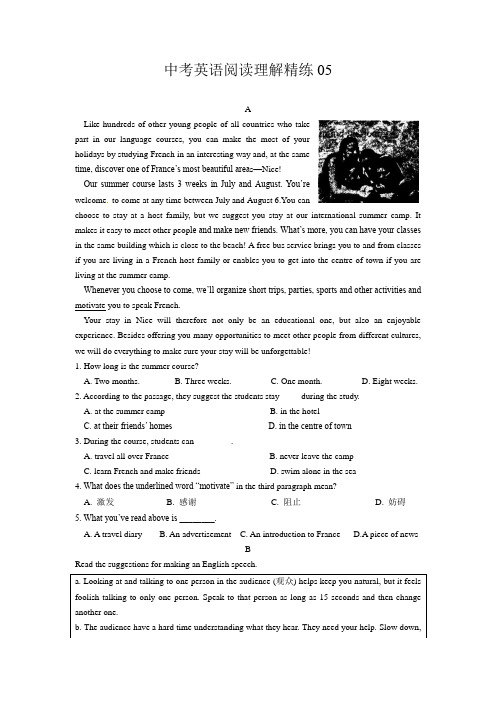
中考英语阅读理解精练05ALike hundreds of other young people of all countries who takepart in our language courses, you can make the most of yourholidays by studying French in an interesting way and, at the sametime, discover one of France’s most beautiful area s—Nice!Our summer course lasts 3 weeks in July and August. You’rewelcome to come at any time between July and August 6.You canchoose to stay at a host family, but we suggest you stay at our international summer camp. It makes it easy to meet other peop le and make new friends. What’s more, you can have your classes in the same building which is close to the beach! A free bus service brings you to and from classes if you are living in a French host family or enables you to get into the centre of town if you are living at the summer camp.Whenever you choose to come, we’ll organize short trips, parties, sports and other activities and motivate you to speak French.Your stay in Nice will therefore not only be an educational one, but also an enjoyable experience. Besides offering you many opportunities to meet other people from different cultures, we will do everything to make sure your stay will be unforgettable!1. How long is the summer course?A. Two months.B. Three weeks.C. One month.D. Eight weeks.2. According to the passage, they suggest the students stay ____ during the study.A. at the summer campB. in the hotelC. at their friends’ homesD. in the centre of town3. During the course, students can ________.A. travel all over FranceB. never leave the campC. learn French and make friendsD. swim alone in the sea4. What does the underlined word “motivate” in the third paragraph mean?A. 激发B. 感谢C. 阻止D. 妨碍5. What you’ve read above is ________.A. A travel diaryB. An advertisementC. An introduction to FranceD.A piece of newsBRead the suggestions for making an English speech.words.A. aB. bC. cD. d7. Billy: When I come face to face with the audience, where should my eyes fall upon? Do I have to look front, or look around from time to time?A. aB. cC. eD. f8.Amy:When I am talking, I can’t help waving(挥动)my hands, for I think it can help me express what I want to say better. But my classmates say I look funny and foolish by doing this.A. dB. eC. fD. g9. Betty: I know that it’s not right to speak fast. But I am afraid that I can’t finish my talk in the given time if I speak slowly.A. bB. dC. fD. g10.Tony: Should I talk in American English or British English?A. aB. bC. cD. gCIs the world too crowded? Well, that’s a hard question to answer. It’s all a matter of perspective(视角).In Montana, you might drive for a mile in any direction and not see another human being. In Macao,60,000 people live in every square mile!What is true i s that the world’s population doesn’t stay the same. It has been increasing at a very fast rate(比例).That’s in part because in each generation(代) these are more people who then have children than in the last generation.Five hundred years ago, the population of the world was about 460 million. In 1900, the world’s population was under 2 billion(十亿).Right now it is doubling every 40 years. That means, if thisrate of growth continues, when you are a parent, there will be twice as many people on earth as there are now. Wow! Now that’s a whole lot of people! Soon the world’s population will probably reach 7 billion. Some people worry about that! But there is a lot of disagreement about just how many people on earth equals (相当于) too many people. But everyone agrees that the more people there are, the more resources (资源) the world needs to feed, house and take care of all of them, and the more need there is to think carefully about how we live and use the earth’s resources.11. From the first paragraph we can know that ________.A. Montana is too crowdedB. Macao is too crowdedC. the world is too crowdedD. the world is not too crowded12. The population is increasing fast partly because ________.A. people live longer than beforeB. there are less wars than beforeC. medicine is developing faster than beforeD. more couples now would like to have children than before13. What was the world’s population 100 years ago?A. 450 million.B. About 2 billion.C. 40 billion.D. 7 billion.14. The writer thinks that with the population increasing, we should ________.A. find more resourcesB. use more resourcesC. think about our ways of livingD. move to other places15. From the passage we can learn that the writer ________.A. thinks the world already has too many peopleB. thinks the world can feed no more than 7 billion peopleC. is not sure when the world’s population will reach 7 billionD. is not sure what the largest population that the world can feed isDAccording lo a new survey. Student s’safety has become a big problem .Nearly 50% of students say they are worried about robbery (抢劫)on the way to and from school. Now in main big cities in China some schools have taught all unusual lesson: self-protection. Students like this lesson because there are no exams or boring classes. And they can learn how to save lives and know how to stop danger before it really happens.Chen Haoyu, a teacher at Beijing No 25 Middle School .give young students advice on how to deal with dangerIf you are robbedKeep calm. lf you can not cry for help or run away. Give the robber your money. Try to remember what the robber looks like and tell the police later, if you are in a traffic accident.It a car hits you. You should remember the car number, if it is a bicycle. Try to call your parents before you let the rider go. This is because you don't know how seriously you are hurt If it is raining hard and there is lighting (闪电) .Don’t stay in high places and stay away from trees.When there is a fire. Get away as fast as yon can. Put wet things on your body and try to find an exit. Do not lake the lift.If someone is drowning (溺水).If you can’t swim, don’t get into the water. Cry out for help.Remember that danger is never as far away as you think. Take care of yourself at all times!16. Why do students like the self-protection lesson?①Because there are no tests. ②Because the lessons are boring③ Because they can learn how to save lives.④Because they know how to slop danger before it happens.A. ①②B. ②③C. ①②④D. ①③④17. What will you do if a bicycle hurts you?A.I will remember the bicycle number.B.I won't let the rider go until I rail my parents.C. will let the rider go before I call my parents.D.I will let the rider go because I know how seriously I am hurt.18. If your house is on fire, you must ________.A. put dry things on your bodyB. run quickly and take the liftC. run away and find an exit as quickly as you CanD. take everything you have and then run away19. There _____ ways of self-protection mentioned in the passage.A. 3B. 4C.5D.620. The best title for this passage is ______.A. How to Keep CalmB. Self-protectionC. An usual lessonD. DangerKey: 1-5BACAB 6-10DACAD 11-15BDBCA 16-20DBCCB。
部编小升初语文文言文阅读试题50篇及答案
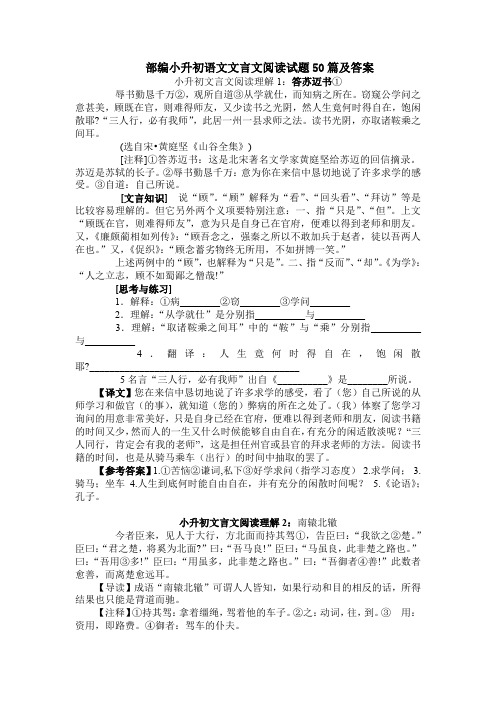
部编小升初语文文言文阅读试题50篇及答案小升初文言文阅读理解1:答苏迈书①辱书勤恳千万②,观所自道③从学就仕,而知病之所在。
窃窥公学问之意甚美,顾既在官,则难得师友,又少读书之光阴,然人生竟何时得自在,饱闲散耶?“三人行,必有我师”,此居一州一县求师之法。
读书光阴,亦取诸鞍乘之间耳。
(选自宋•黄庭坚《山谷全集》)[注释]①答苏迈书:这是北宋著名文学家黄庭坚给苏迈的回信摘录。
苏迈是苏轼的长子。
②辱书勤恳千万:意为你在来信中恳切地说了许多求学的感受。
③自道:自己所说。
[文言知识]说“顾”。
“顾”解释为“看”、“回头看”、“拜访”等是比较容易理解的。
但它另外两个义项要特别注意:一、指“只是”、“但”。
上文“顾既在官,则难得师友”,意为只是自身已在官府,便难以得到老师和朋友。
又,《廉颇蔺相如列传》:“顾吾念之,强秦之所以不敢加兵于赵者,徒以吾两人在也。
”又,《促织》:“顾念蓄劣物终无所用,不如拼博一笑。
”上述两例中的“顾”,也解释为“只是”。
二、指“反而”、“却”。
《为学》:“人之立志,顾不如蜀鄙之僧哉!”[思考与练习]1.解释:①病________②窃________③学问________2.理解:“从学就仕”是分别指__________与__________3.理解:“取诸鞍乘之间耳”中的“鞍”与“乘”分别指__________与__________4.翻译:人生竟何时得自在,饱闲散耶?__________________________________________5名言“三人行,必有我师”出自《__________》是________所说。
【译文】您在来信中恳切地说了许多求学的感受,看了(您)自己所说的从师学习和做官(的事),就知道(您的)弊病的所在之处了。
(我)体察了您学习询问的用意非常美好,只是自身已经在官府,便难以得到老师和朋友,阅读书籍的时间又少,然而人的一生又什么时候能够自由自在,有充分的闲适散淡呢?“三人同行,肯定会有我的老师”,这是担任州官或县官的拜求老师的方法。
七年级语文-课外现代文阅读理解训练(50篇含答案)
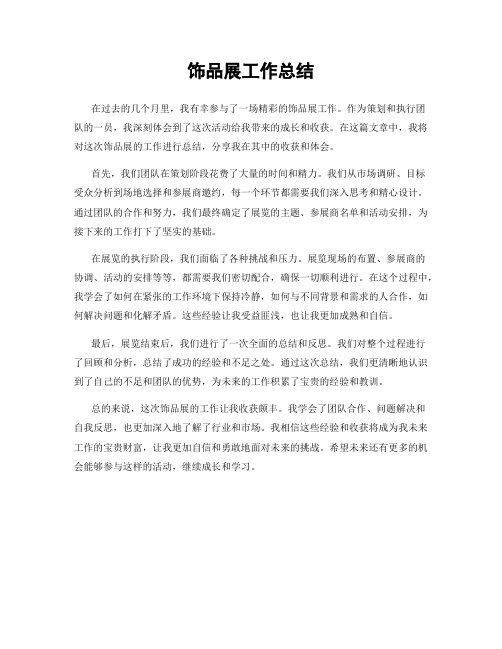
饰品展工作总结
在过去的几个月里,我有幸参与了一场精彩的饰品展工作。
作为策划和执行团
队的一员,我深刻体会到了这次活动给我带来的成长和收获。
在这篇文章中,我将对这次饰品展的工作进行总结,分享我在其中的收获和体会。
首先,我们团队在策划阶段花费了大量的时间和精力。
我们从市场调研、目标
受众分析到场地选择和参展商邀约,每一个环节都需要我们深入思考和精心设计。
通过团队的合作和努力,我们最终确定了展览的主题、参展商名单和活动安排,为接下来的工作打下了坚实的基础。
在展览的执行阶段,我们面临了各种挑战和压力。
展览现场的布置、参展商的
协调、活动的安排等等,都需要我们密切配合,确保一切顺利进行。
在这个过程中,我学会了如何在紧张的工作环境下保持冷静,如何与不同背景和需求的人合作,如何解决问题和化解矛盾。
这些经验让我受益匪浅,也让我更加成熟和自信。
最后,展览结束后,我们进行了一次全面的总结和反思。
我们对整个过程进行
了回顾和分析,总结了成功的经验和不足之处。
通过这次总结,我们更清晰地认识到了自己的不足和团队的优势,为未来的工作积累了宝贵的经验和教训。
总的来说,这次饰品展的工作让我收获颇丰。
我学会了团队合作、问题解决和
自我反思,也更加深入地了解了行业和市场。
我相信这些经验和收获将成为我未来工作的宝贵财富,让我更加自信和勇敢地面对未来的挑战。
希望未来还有更多的机会能够参与这样的活动,继续成长和学习。
四上语文期末专项复习卷—古诗文阅读理解(精练13篇)

B.凉州词又名凉州歌,是一种曲调名。
C.凉州词多写的是边塞军旅生活。
D.这首诗抒发战士们豪迈的感情:战斗来临,投身战场,为国捐躯。
4、 这首诗中,使你感受到战争的残酷和战士们英勇无畏的句子是“
1
参考答案 一、 1、 (1)看见路边的李树结了很多果子,枝 条都被压弯了。
(2)把李子摘下来一尝, 果 然是那样。 2、 这个故事告诉我们不能盲目地跟从, 遇事要有主见。 二、 1、 欲饮琵琶马上催 醉卧沙场君莫笑 2、 唐 王翰 3、 A 4、 醉卧沙场君莫笑 古来征战几人回 三、 1、 山海经
译:_
(2)取之信然。
译:
2、 这个故事使你获得了什么启示?
二、阅读古诗 , 完成练习题。
凉州词
葡萄美酒夜光杯,
古来征战几人回 ?
1、 补充诗句。
2、 这首诗的作者是
_(填写朝代)诗人_
3、 对这首诗的赏析,不正确的一项是( )。
A.这首诗可以想象画面来朗读快、轻松。
四年级上册语文期末专项复习卷
古诗文阅读理解(精练13 篇)
一、 文言文阅读。
王戎不取道旁李
王戎七岁, 尝与诸小儿游。 看道边李树多子折枝,诸儿竞走取之, 唯戎不动。
人问之,答 曰 :“树在道旁而多子,此必苦李。”取之信然。
注释: 尝: 曾经。 诸 :一 些,这 些。
1、 写出下列句子的大致意思。
(1)看道边李树多子折枝。
10
9
3、 只有站得高, 看得远, 才能不怕阻挠, 不被眼前的困难吓倒。 4、 作者表明自己站得高,看得远,不怕对改革的非议、阻挠,具有勇往直 前、无所畏惧的讲取精神。 八、 1、 A 2、 王蓝田性子很急。有一次,他吃鸡蛋,用筷子扎, 用脚踩,都没把鸡蛋弄 破。他非常生气, 把鸡蛋从地上捡起来放到嘴里, 咬破了就吐了。 3、 俗话说“心急吃不了热 豆腐”, 你这么着急,能做成什么事呢?还 是要有点儿耐心才行啊! 九、 1、 BCA 千姿百态 观察要从多 角 度; 2、 不 识庐山真面目 只缘身在此山中 旁观者清 C。 十、 1、 C 2、 B 3、 A 4、 要懂得节制与取舍,不要太贪心, 有舍才有得。 十一 、 1、 A 2、 D 3、 不 见九州同 无忘告乃翁 4、 父 亲对国家前途的担忧,和 对国家统一的无比渴望 十二、 1、 知道 到 休息 感悟 2、 圣人受到启发,感悟到钻木取火的道理,就试着用小树枝来钻火,终于 引发火花,燃 起火种,人们把这位圣人称为“燧人”。 3、 有鸟类鸮(xiāo), 啄树则灿然火出。 4、 钻木取火是根据摩擦生热的原理产生的。木材比较粗糙,摩擦时会产生 热 量, 而且木材本身就是易燃物,所以就会生出火来。 5、 示例:牛顿看到苹果落地,从而受到启发,发现了万有引力。鲁班受到 锯齿状树叶划伤皮肤的启发,发明了锯。 十三、 1、 跑 行 走,走路 我 剩下,余下 2、 我小时候就特别喜欢读书 3、 余幼时即嗜学。 4、 没钱买书,借 书抄书也要读书学习。 天冷时, 手指冻得不能弯曲、 伸直, 也不停止抄书。
五年级下册语文专项阅读理解练习(15篇)
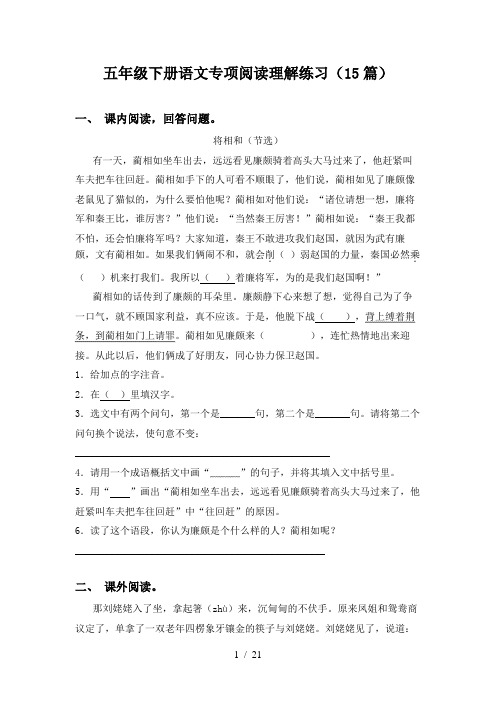
五年级下册语文专项阅读理解练习(15篇)一、课内阅读,回答问题。
将相和(节选)有一天,蔺相如坐车出去,远远看见廉颇骑着高头大马过来了,他赶紧叫车夫把车往回赶。
蔺相如手下的人可看不顺眼了,他们说,蔺相如见了廉颇像老鼠见了猫似的,为什么要怕他呢?蔺相如对他们说:“诸位请想一想,廉将军和秦王比,谁厉害?”他们说:“当然秦王厉害!”蔺相如说:“秦王我都不怕,还会怕廉将军吗?大家知道,秦王不敢进攻我们赵国,就因为武有廉颇,文有蔺相如。
如果我们俩闹不和,就会削.()弱赵国的力量,秦国必然乘.()机来打我们。
我所以()着廉将军,为的是我们赵国啊!”蔺相如的话传到了廉颇的耳朵里。
廉颇静下心来想了想,觉得自己为了争一口气,就不顾国家利益,真不应该。
于是,他脱下战(),背上缚着荆条,到蔺相如门上请罪。
蔺相如见廉颇来(),连忙热情地出来迎接。
从此以后,他们俩成了好朋友,同心协力保卫赵国。
1.给加点的字注音。
2.在()里填汉字。
3.选文中有两个问句,第一个是_______句,第二个是_______句。
请将第二个问句换个说法,使句意不变:___________________________________________________4.请用一个成语概括文中画“﹏﹏﹏”的句子,并将其填入文中括号里。
5.用“”画出“蔺相如坐车出去,远远看见廉颇骑着高头大马过来了,他赶紧叫车夫把车往回赶”中“往回赶”的原因。
6.读了这个语段,你认为廉颇是个什么样的人?蔺相如呢?__________________________________________________二、课外阅读。
那刘姥姥入了坐,拿起箸(zhù)来,沉甸甸的不伏手。
原来凤姐和鸳鸯商议定了,单拿了一双老年四楞象牙镶金的筷子与刘姥姥。
刘姥姥见了,说道:“这叉爬子比俺们那里的铁锨还沉,那里拿得动他。
”说得众人都笑起来。
只见一个媳妇端了一个盒子站在当地,一个丫鬟上来揭去盒盖,里面盛着两碗菜。
【部编】小升初文言文阅读及专项练习50篇含答案(全)

【部编】小升初文言文阅读及专项练习50篇含答案(全)小升初文言文阅读理解1:青文胜为民请命青文胜,字质夫,夔州①人。
仕为龙阳典史④。
龙阳濒洞庭④,岁罹水患,逋赋⑤数十万,敲扑死者相踵。
文胜慨然诣阙⑥上疏⑦,为民请命。
再上,皆不报⑧。
叹曰:“何面目归见父老!”复具疏,击登闻鼓以进,遂自经于鼓下。
帝闻大惊,悯其为民杀身,诏宽⑨龙阳租二万四千余石⑩,定为额。
邑人建祠祀之。
妻子贫不能归,养以公田百亩。
万历⑾十四年诏有司⑿春秋致祭,名其祠曰“惠烈”。
(选自《明史》卷一百四十)[注释] ①夔(kuí)州:古州名,在今四川境内。
②龙阳:古县名,在今湖南境内。
③典史:县令的属官。
④洞庭:指洞庭湖。
⑤逋赋:拖欠赋税。
⑥阙(què):宫殿外的望楼。
此指宫门外。
⑦疏:给皇帝的奏章。
⑧不报:不答复。
⑨诏宽:皇帝下令宽贷。
⑩石:古代容量单位,十斗为一石。
⑾万历:明神宗年号。
⑿有司:官吏。
[文化常识]“登闻鼓”及其他。
登闻鼓是古代统治者为了表示听取臣民谏议之言或怨抑之情,特在朝堂外悬鼓,让臣民击鼓以使里面的人听到。
从县、府、州直至皇宫外,都设有“登闻鼓”。
所谓“击鼓鸣怨”就是敲击登闻鼓喊冤枉。
然而古代有几个青天大老爷呢?登闻鼓只是形式罢了,从上文看,青文胜击鼓后还不是因毫无作用转而自杀的吗?有句谚语叫“堂堂衙门八字开,有理无钱莫进来”。
古代百姓申怨还有一种方法,即拦住官员出行的马车,诉说冤情,但效果也极小。
[思考与练习]1.解释:①仕②濒③具④悯⑤邑⑥祀2.选择:①“文胜慨然诣阙上疏”中的“诣”,解释为:(A)上告;(B)到;(C)登上;(D)责骂。
②“妻子贫不能归”中的“归”,是指(A)回到娘家;(B)回到故乡;(c)没有住房;(D)不能耕种。
3.翻译:①岁罹水患②死者相踵③遂自经于鼓下④养以公田百亩4.理解:这则故事除赞扬青文胜为民请命外,还说明什么【译文】青文胜,字质夫,夔州人。
做官担任龙阳县令的属官。
中考英语专项突破阅读理解精练15篇
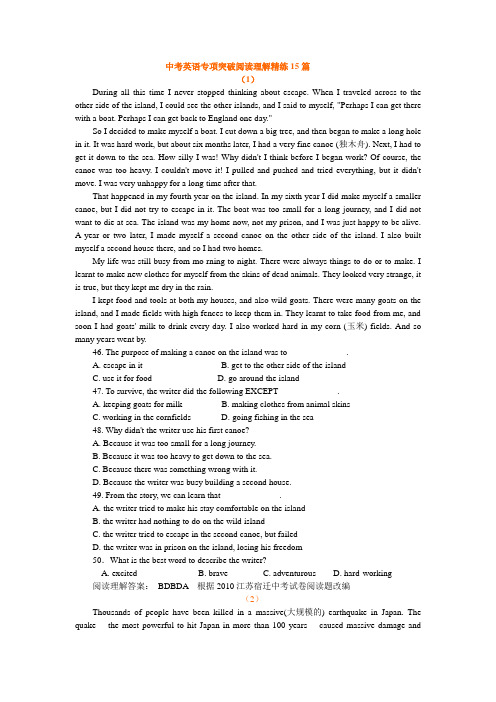
中考英语专项突破阅读理解精练15篇(1)During all this time I never stopped thinking about escape. When I traveled across to the other side of the island, I could see the other islands, and I said to myself, "Perhaps I can get there with a boat. Perhaps I can get back to England one day."So I decided to make myself a boat. I cut down a big tree, and then began to make a long hole in it. It was hard work, but about six months later, I had a very fine canoe (独木舟). Next, I had to get it down to the sea. How silly I was! Why didn't I think before I began work? Of course, the canoe was too heavy. I couldn't move it! I pulled and pushed and tried everything, but it didn't move. I was very unhappy for a long time after that.That happened in my fourth year on the island. In my sixth year I did make myself a smaller canoe, but I did not try to escape in it. The boat was too small for a long journey, and I did not want to die at sea. The island was my home now, not my prison, and I was just happy to be alive.A year or two later, I made myself a second canoe on the other side of the island. I also built myself a second house there, and so I had two homes.My life was still busy from mo rning to night. There were always things to do or to make. I learnt to make new clothes for myself from the skins of dead animals. They looked very strange, it is true, but they kept me dry in the rain.I kept food and tools at both my houses, and also wild goats. There were many goats on the island, and I made fields with high fences to keep them in. They learnt to take food from me, and soon I had goats' milk to drink every day. I also worked hard in my corn (玉米) fields. And so many years went by.46. The purpose of making a canoe on the island was to _____________.A. escape in itB. get to the other side of the islandC. use it for foodD. go around the island47. To survive, the writer did the following EXCEPT _____________.A. keeping goats for milkB. making clothes from animal skinsC. working in the cornfieldsD. going fishing in the sea48. Why didn't the writer use his first canoe?A. Because it was too small for a long journey.B. Because it was too heavy to get down to the sea.C. Because there was something wrong with it.D. Because the writer was busy building a second house.49. From the story, we can learn that _____________.A. the writer tried to make his stay comfortable on the islandB. the writer had nothing to do on the wild islandC. the writer tried to escape in the second canoe, but failedD. the writer was in prison on the island, losing his freedom50.What is the best word to describe the writer?A. excitedB. braveC. adventurousD. hard-working阅读理解答案:BDBDA根据2010江苏宿迁中考试卷阅读题改编(2)Thousands of people have been killed in a massive(大规模的) earthquake in Japan. The quake -- the most powerful to hit Japan in more than 100 years -- caused massive damage andmany people are missing and feared dead.The 8.9 magnitude quake struck Friday(March 11) off Japan's eastern coast, and prompted(引发) tsunami warnings(海啸警报)across the Pacific as far away as South America and the U.S. West Coast. Several days after a 8.9-magnitude earthquake and resulting 10-meter-high tsunami devastated the coastline. The United States Geological Survey says it was the fifth largest earthquake since 1900. The largest, with a 9.5 magnitude, shook Chile(智利) in 1960.In Japan, the tsunami swept away boats, cars and hundreds of houses in coastal areas north of Tokyo. The quake shook buildings in the Japanese capital and caused several fires. All train and subway traffic in Tokyo has been stopped, and thousands of people there were unable to get back home. People are just trying to find clean water. Food supplies are running out. In the convenience stores, there are no rice balls left. There is no bottled water left. People are facing a really serious situation in the days ahead for these people that are living in areas that were only moderately(普通的)damaged. The final death toll could range from the thousands to tens of thousands, depending on how many of these communities are gone.Japanese Prime Minister Naoto Kan said the government would do everything it can to minimize(使降到最低)the effects of the disaster. And in Washington, President Obama said the United States is ready to help the people of Japan.51. The underline word damage means_____________ in the article.A. illnessB. disasterC. terrorD. danger52. Which is true according to the passage?A. Thousands of people have been killed in a massive earthquake in Japan.B. Only people in areas that were only moderately damaged are facing a really serious situation in the days.C. The tsunami devastated not only the coastline in Japan, but also the eras across the Pacific .as far away as South America and the U.S. West Coast.D. The massive earthquake caused the tsunami.53. According to the passage, which earthquak e is the largest one since 1990 ?A. the one happened in Japan on March 11, 2011B. the one in Chile in 1960C. the fifth largest earthquake since 1900D. We don't know.54. If you're in Tokyo these days, what you can't get from the con venience store?A. newspapers and magazinesB. some medicineC. paper napkins and toothpastesD. rice balls and bottled water55. The passage can't be in/on __________.A. March 10th newspapersB. TVC. InternetD. Radios阅读理解答案:ADBAC(3)第二节:请仔细阅读56-60题中的语言材料,从所给的A到F六个选项中选出与它们相对应的选项,其中一项为多余。
语文部编版五年级下册阅读理解专项练习(共短文)(考试高分题型)
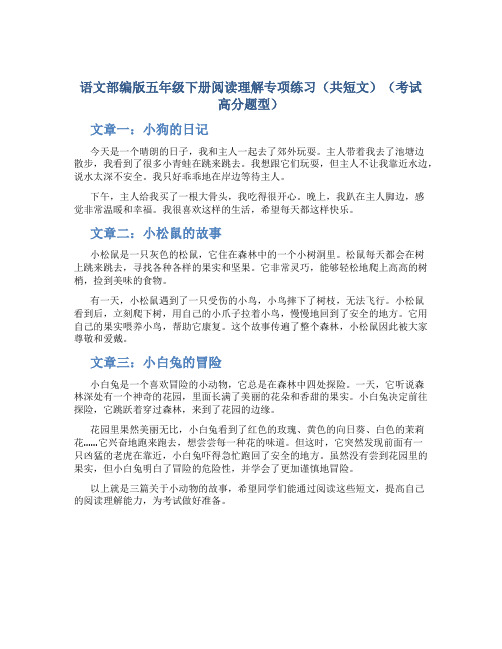
语文部编版五年级下册阅读理解专项练习(共短文)(考试高分题型)文章一:小狗的日记今天是一个晴朗的日子,我和主人一起去了郊外玩耍。
主人带着我去了池塘边散步,我看到了很多小青蛙在跳来跳去。
我想跟它们玩耍,但主人不让我靠近水边,说水太深不安全。
我只好乖乖地在岸边等待主人。
下午,主人给我买了一根大骨头,我吃得很开心。
晚上,我趴在主人脚边,感觉非常温暖和幸福。
我很喜欢这样的生活,希望每天都这样快乐。
文章二:小松鼠的故事小松鼠是一只灰色的松鼠,它住在森林中的一个小树洞里。
松鼠每天都会在树上跳来跳去,寻找各种各样的果实和坚果。
它非常灵巧,能够轻松地爬上高高的树梢,捡到美味的食物。
有一天,小松鼠遇到了一只受伤的小鸟,小鸟摔下了树枝,无法飞行。
小松鼠看到后,立刻爬下树,用自己的小爪子拉着小鸟,慢慢地回到了安全的地方。
它用自己的果实喂养小鸟,帮助它康复。
这个故事传遍了整个森林,小松鼠因此被大家尊敬和爱戴。
文章三:小白兔的冒险小白兔是一个喜欢冒险的小动物,它总是在森林中四处探险。
一天,它听说森林深处有一个神奇的花园,里面长满了美丽的花朵和香甜的果实。
小白兔决定前往探险,它跳跃着穿过森林,来到了花园的边缘。
花园里果然美丽无比,小白兔看到了红色的玫瑰、黄色的向日葵、白色的茉莉花……它兴奋地跑来跑去,想尝尝每一种花的味道。
但这时,它突然发现前面有一只凶猛的老虎在靠近,小白兔吓得急忙跑回了安全的地方。
虽然没有尝到花园里的果实,但小白兔明白了冒险的危险性,并学会了更加谨慎地冒险。
以上就是三篇关于小动物的故事,希望同学们能通过阅读这些短文,提高自己的阅读理解能力,为考试做好准备。
- 1、下载文档前请自行甄别文档内容的完整性,平台不提供额外的编辑、内容补充、找答案等附加服务。
- 2、"仅部分预览"的文档,不可在线预览部分如存在完整性等问题,可反馈申请退款(可完整预览的文档不适用该条件!)。
- 3、如文档侵犯您的权益,请联系客服反馈,我们会尽快为您处理(人工客服工作时间:9:00-18:30)。
①Mr. Smith is our Chinese teacher. He always asks the same student to answer his questions because he doesn't look at the students at all. Yesterday he questioned Dick three times. Dick was very angry. After class Dick asked me, "What shall I do?" I told him a good idea. Now we are having a Chinese class. Mr. Smith wants one of us to read the text. "Dick, please read the text." "Dick isn't here today." Dick stands up and says. "Oh, I see. you read it, please."1. Mr. Smith teaches us ___.A. EnglishB. MathsC. PhysicsD. Chinese2. He always asks the same student to ___.A. translate the textB. read the textC. tell a storyD. answer his questions3. Yesterday he q uestioned Dick ___.A. OnceB. TwiceC. three timesD. four times4. ___ told Dick a good idea.A. TimB. Mr. SmithC. The writerD. "I"5. Is the idea really good?___.A. Yes, it isB. No, it isn'tC. Yes, it doesD. No, it doesn't②One Sunday morning Mr Green and his child , Bill ,are in a big shop . Mr Green wants to buy a new blouse for Mrs Green . Bill likes oranges , so his father buys twokilos( 公斤)of oranges for him , too . Bill wants to buy some picture—books and colour pencils , too . There are many people in the shop . They are men and women , old and young . They all want to buy something there .( )6.Mr Green goes to the shop with .A Mrs greenB his sonC his daughterD his father( )7.Mr Green wants to buy a new blouse for .A.Bill‟s motherB. BillC. his friendD.other people( )8.Bill likes .A .all the things B. the new blouse C. oranges D.orange( )9.Bill wants to buy .A . some picture —books B. some colour pencilsC . clothes in the shopD . A and B( )10.The shop is .A.emptyB.closeC.full of childrenD.full of peopleA man has a bird. It is very clever. Every day the man speaks to the bird.“Hello!”he says. “Hello!”the bird answers.“What are you doing?”says the man.“What are you doing?”says the bird.The man is not at home one day. A thief comes in. He is taking many things.“Hello!”The thief hears the bird's words.“What are you doing?”The thief is very afraid,so he does not take any things and runs out of the house.1. The man teaches the bird ________.A. how to say somethingB. how to sing songsC. how to eat somethingD. how to dance2. The bird is ________.A. very niceB. very cleverC. very beautifulD. very silly(傻的)3. The man speaks to the bird ________.A. sometimesB. once a weekC. every weekD. every day4. The thief is taking ________ things from the house.A. a fewB. a littleC. a lot ofD. some5. The thief ________ out of the room.A. walksB. comesC. runsD. goes④Have you ever wondered about the stars? In some ways,stars are like people. They are born. They grow old. And they die.A star is born from dust and gas. Slowly the dust and gas make a ball. The ball gets very hot. Then it starts to give off light. The young star grows into a giant. Many years go by. The older star begins to get small again. At last its light goes out. The star's life is over.1. Dust and _________ make a star.A. gasB. snowC. rain2. This story tells about _________.A. old peopleB. the life of a starC. the number of stars in the sky3. In the first part of the story,what does the word “wondered”mean?A. movedB. looked atC. asked yourself4. Stars give off light because they are very _________.A. smallB. hotC. old5. You can guess from the story that most stars are around for a _________ time.A. longB. shortC. niceWe spent a day in the country and picked a lot of flowers. Our car was full of flowers inside! On the way home we had to stop at traffic lights , and there my wife saw the bookshelf.It stood outside a furniture (家具)shop. "Buy it," she said at once. "We'll carry it home on the roof-rack (车顶架) . I've always wanted one like that . "What could I do? Ten minutes later I was twenty dollars poorer, and the bookshelf was tied on to the roof-rack. It was tall and narrow, quite heavy too .As it was getting darker, I drove slowly . Other drivers seemed more polite than usual that evening. The police even stopped traffic to let us through . Carrying furniture was a good idea.After a time my wife said, "There's a long line of cars behind . Why don't they overtake (超车) ?"Just at that time a police car did overtake. The two officers (警官)inside looked at us seriously when they went past . But then , with a kind smile they asked us to follow their car through the busy traffic. The police car stopped at our village church (教堂) . One of the offices came to me."Right, sir, " he said. "Do you need any more help now?"I didn't quite understand . "Thanks, officer, " I said . "You've been very kind. I lived just down the road. "He was looking at our things: first at the flowers, then at the bookshelf. "Well, Well, " he said and laughed . "It's a bookshelf you've got there ! We thought it was-er, something else . "My wife began to laugh . Suddenly I understood why the police drove here .I smiled at the officer. "Yes, it's a bookshelf, but thanks again." I drove home as fast as I could .1 . From the story we know that ___________.A . the writer was poor and didn't buy the bookshelf for his wifeB . the writer's wife didn't like the bookshelf at allC . the writer was always glad to buy something for his wifeD . the writer was not very dad to buy the bookshelf for his wife2 . What made the writer think that carrying furniture was "a good idea"?A . He could drive slowly and it was safe.B . Other drivers would let him go first .C . His wife could use a new bookshelf.D . He could save a lot of money and time.A . Because they thought the writer liked studying very much and needed a bookshelf.B . Because they didn't think it was polite to overtake a car with a bookshelf on it .C . Because they thought somebody in the writer's family had died and he needed help .D . Because they thought it was dangerous to carry a bookshelf on a car.4 . Why did the writer's wife begin to laugh?A . Because now she knew what mistake the police had made.B . Because at last her husband understood why the police had driven to the church .C . Because the officer was always looking at the flowers and the bookshelf.D . Because the police had helped them a lot .5 . When did the officers begin to realize (意识到)they had made a mistake?A . Before they arrived at the church.B . Before they overtook the writer's carC . After one of them looked at the flowers and the bookshelf carefully at the church.D . After the writer's family left the church.。
